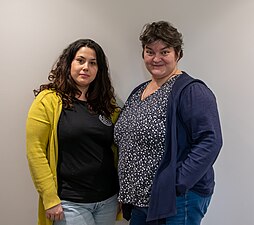Wikimedia CEE Hub
WIKIMEDIA CEE HUB
Regional hub covering Central and Eastern Europe
 |
| Wikimedia CEE |
|---|
| CEE Hub |
| CEE Hub Governance |
| Meetings |
| Campaigns |
| CEE Spring |
| Collaborations |
| Communication |
| Main Page |
The Wikimedia CEE Hub is a network of communities and Wikimedia affiliates that have been organised in the Wikimedia CEE (Central and Eastern Europe) group since 2011. The goal of this regional hub is to formalise the ongoing collaboration within the CEE region and provide services for communities that support them in their work and enable them to grow how they see fit for them.
Background[edit]
The process of designing the CEE Hub started at the Wikimedia CEE Online Meeting 2020, in close alignment with the 2030 strategy recommendations. The initial CEE Hub group composed of volunteers and staff members of Wikimedia affiliates from Poland, Czechia, Austria, Ukraine, Hungary, Serbia, Croatia, North Macedonia, Armenia and later also Russia, have worked since 2020 on a concept that will provide services to support especially the less well organised parts of the region. This concept and research phase was implemented partly with the support of the WMF rapid funds strategy grant CEE Needs Research, which through Wikimedia Poland (WMPL) conducted interviews with 21 different communities and affiliates in the region. After receiving this grant, the group submitted and received another grant (MS Grants) from the WMF's in July 2022: Building a CEE Hub for the implementation of one year pilot CEE Hub project. This project's official end date is December 31st 2023 (due to initial project implementation delay and based on approved project extension).
Pillars[edit]
The initial programme of the CEE Hub (for Year 1) focused on the following programmatic pillars:
- Administrative
- Programmatic
- Communication
Organisation[edit]
CEE Hub Governance and the Steering Committee[edit]

The CEE Hub is governed by the Steering Committee.
At the CEE Meeting 2022 the first official Steering Committee (SC) was suggested by the members of the CEE Hub group (described above). This first SC replaced the interim CEE Hub SC. The composition of the first CEE Hub's SC was presented to the participants of the CEE meeting in Ohrid.
The current Steering Committee was appointed at the CEE Meeting 2023 in September in Tbilisi, Georgia.
The Steering Committee currently consists of the following ten (10) members:
- Anton Protsiuk (Ukraine)
- Tisza Gergő (Hungary)
- Başak Tosun (Türkiye)
- Ivana Madžarević (Serbia)
- Kiril Simeonovski (North Macedonia)
- Klára Joklová (Czech Republic)
- Michał Buczyński (Poland)
- Philip Kopetzky (Austria)
- Toni Sant (Malta)
- Wojciech Pędzich (Poland)
- Special advisers
- Delphine Ménard (Expertise: Onboarding, Grants, HR)
- Natalia Szafran-Kozakowska (Expertise: Volunteer Support, CEE Research)
- CEE Hub group
This group (formerly know as the wider group) is open to everyone who is interested to follow the work and development of the CEE Hub. Currently (March 2024), the group consists of ten (10) members. If you are interested in becoming a member, please contact staff members.
Staff[edit]
- CEE Hub Coordinator: Barbara Klen (Croatia)
- Programme and Administrative support: Toni Ristovski (North Macedonia)
-
2023/2024 Steering Committee members
-
Staff members
-
Special advisers
News&Updates[edit]
You can follow the activities and work of the Wikimedia CEE Hub here. Updates for the project are posted on the monthly basis.
Grants & Research[edit]
As of November 2023, the CEE Hub is funded through Wikimedia Foundation for the grant period 2022-2023 or Year 1 under the MSIG proposal named Building a CEE Hub.
The CEE Hub proposed another grant proposal named Stronger CEE Hub for continuing its activities in 2024 (Year 2).
- Research papers funded by Wikimedia CEE Hub
- Community Mapping and Data by Biyanto Rebin (July-August 2023)
- Studying barriers of smaller communities by Violeta Frimu (September-December 2023)
Meetings[edit]
Wikimedia CEE Hub group has regular bi-weekly online meetings. There were also several hybrid and/or in-person meetings of interested volunteers from the CEE (prior to the formation of the Steering Committee) and several meetings of the Steering Committee members and CEE Hub Staff (after the approval of the grant proposal in 2022). For every meeting which was held during the process and after the formalisation of the CEE Hub you can find meeting details on the Meta page dedicated to the events.
Collaborations[edit]
During 2023, besides regular contact and meetings with the communities from the Central and Eastern Europe, the CEE Hub also had meetings with other stakeholders. We are having frequent contact with different Wikimedia Foundation teams and employees, but also meetings with affiliates and initiatives outside the CEE (Wikimedia Indonesia, Wikimedia DC, WikiVibrance Project, Wikimedia Sverige) and other interested external NGOs and individuals.
The CEE Hub is also implementing one initiative called CEE Catch Up, which is a series of bi-monthly meetings about projects, activities and communities of the CEE region. The initiative is curated by the Wikimedia CEE Hub and Wikimedia Foundation’s Movement Communications regional specialist Natalia Szafran-Kozakowska.
Contact information[edit]
You can find our email addresses and information about other ways of communication here. If you want to schedule a separate meeting with staff members about any Wikimedia-related topic,
Endorsements[edit]
You can find previous endorsements for the project on the separate page. You can still endorse the project; read the information outlined in the grant proposals for Year 1 and Year 2 for further information.











